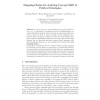14 search results - page 2 / 3 » Intensional Associations in Dataspaces |
VLDB
2004
ACM
13 years 10 months ago
2004
ACM
We demonstrate a system to automatically grab data from data intensive web sites. The system first infers a model that describes at the intensional level the web site as a collec...
HLPPP
1991
13 years 8 months ago
1991
Swarm is a computational model which extends the UNITY model in three important ways: (1) UNITY’s fixed set of variables is replaced by an unbounded set of tuples which are add...
SEMWEB
2009
Springer
13 years 11 months ago
2009
Springer
Abstract. For some years now ontologies have been used in Social Science, e.g. , in annotation of newspaper articles for disambiguating concepts within Media Analysis. These ontolo...
DAWAK
1999
Springer
13 years 9 months ago
1999
Springer
One of the most challenging problems in data manipulation in the future is to be able to e ciently handle very large databases but also multiple induced properties or generalizatio...
PKDD
1998
Springer
13 years 9 months ago
1998
Springer
Knowledge discovery in databases (KDD) is a process that can include steps like forming the data set, data transformations, discovery of patterns, searching for exceptions to a pat...

